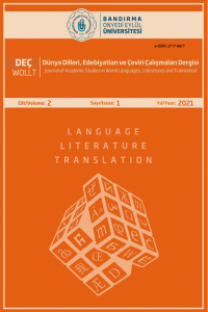“Ağlardan Kurtulma” Olarak Gönüllü Sürgünlük: James Joyce’un Ulysses Romanındaki Sürgün Motifi ve Sürgünün Metaforik Dili Olarak Çeviri
Edward Said ünlü “Sürgün Üzerine Düşünceler” başlıklı denemesinde çağımızı “mülteciler, yerinden edilmiş kişiler ve kültürel göçler çağı” (Said, 2015: 188) olarak tanımlar. Gerçekten sürgünün, bazı bireyler için kişisel, bazıları için ise zorunlu hale gelmiş toplumsal bir gerçeklik olduğu zamanlardan geçmekteyiz. İçinde yoksunluk, kayıp, acı ve hüzün barındırsa da sürgün motifi antik dönemden günümüze kadar edebiyatı ilgilendiren motiflerden biri olarak kullanılmıştır. Ovidius’dan Dante’ye, Joyce’dan Nâzım Hikmet’e kadar birçok yazar ve şair gönüllü veya zorunlu olarak sürgünlük hayatı yaşamış ve bu durumu yaratıcı dehalarının ürününe dönüştürmeyi başarmıştır. Modernitenin getirdiği teknolojik ilerlemenin bir sonucu olarak ulaşım alanında devrim niteliğindeki gelişmeler ile birlikte gezginlik, sürgünlük ve dislokasyon kavramları modernist edebiyatla belli başlı değişimler geçirerek varsıl bir motife dönüşmüştür. James Joyce’un modernist edebiyatın en ünlü metinlerinden biri olarak görülen Ulysses’i gönüllü olarak gittiği sürgünde yazması, sürgün ve edebi yaratıcılık arasındaki asırlardır süren birlikte varoluşun ilginç örneklerinden biri olarak karşımıza çıkmaktadır. Ayrıca sürgün çağını tanımlarken kullanılan “çevrilmiş kültür” (translated culture) tanımı ve sömürgecilik sonrası kuramların çeviriye atfettiği sürgünlük, melezlik, ötekilik gibi metaforlar da “sürgün” ve “çeviri” arasındaki yakın ilişkiye dikkat çekmektedir. Farklı ulusal diller, kültürel söylemler, farklı zaman ve uzam kategorileri arasında daima bir geçişi, hareketi ve Walter Benjamin’in dediği gibi “öbür tarafa” geçişi simgeleyen çeviriyi metaforik olarak sürgün olma durumuyla ilişkilendirebiliriz. Sürgün olma durumu gibi çeviri de zorunlu bir asimilasyon içerir ve yerele yerleşmek, orada yeni bir ses, yeni bir kimlik ve ifade bulmak için çabalar. Tüm bunların ışığında, bu çalışmanın amacı yazarın yaratıcılığını motive eden sürgün motifinin tarihsel ve eleştirel bir genel çerçevesini çizdikten sonra, Joyce’un fiziksel olarak deneyimlediği ve Ulysses’de kullandığı sürgünlük durumu ile edebiyat ve çeviri arasındaki ilişkiselliği ortaya koymaktır.
Anahtar Kelimeler:
Sürgün, çeviri, James Joyce, Ulysses, modernist edebiyat.
Voluntary Exile As “Getting Off The Hooks”: Exile Motif And Translation As A Metaphorical Language Of Exile In James Joyce’s Ulysses
Edward Said, in his essay “Thoughts on exile,” famously describes our age as “the age of refugees, displaced persons, and cultural migrations” (2015:188). Indeed, we are going through a time when exile is a personal reality for some people and a social reality that has become mandatory for others. Although it contains deprivation, loss, pain, and sadness, the exile motif has been used as one of the motifs of interest in literature from the ancient period to the present day. Many writers and poets, from Ovidius to Dante and Joyce to Nâzım Hikmet, lived a life of voluntary or compulsive exile and managed to turn this situation into the product of their creative genius. As a result of the technological progress brought about by modernity, along with the revolutionary developments in the field of transportation, the concepts of travel, exile, and dislocation have undergone major changes and become a rich motif in modernist literature. Being written in a voluntary exile, James Joyce's Ulysses, one of the most famous texts of modernist literature, stands out as one of the interesting examples of coexistence between exile and literary creativity for centuries. In addition, the definition of “translated culture” used to describe the age of exile and metaphors such as exile, hybridity, otherness attributed by post-colonial theories to translation draw attention to the close relationship between “exile” and “translation”. We can metaphorically relate translation that symbolizes a transition between different national languages, cultural discourses, different categories of time and space, and movement, as Walter Benjamin put it, the transition “to the other side,” to the state of exile. Like the state of exile, translation involves forced assimilation and strives for perching itself into the local, to find a new voice, a new identity, and expression there. After drawing a historical and critical general framework of the exile motif that motivated the author's creativity, the purpose of this study is to demonstrate the relationality between literature and translation and the state of exile that Joyce physically experienced and employed in Ulysses.
Keywords:
Exile, translation, James Joyce, Ulysses, modernist literature.,
___
- Bartolini, P. (2008). On the Cultures of Exile, Translation, and Writing. West Lafayette, Ind.: Purdue University Press.
- Benjamin, W. (2008). Çevirmenin Görevi. (A. Cemal Çev.). Çeviri Seçkisi II: Çeviribilim Nedir?. İstanbul: Sel Yayıncılık.
- Brooke-Rose, C. (1996). Exsul. Poetics Today, 17(3), Creativity and Exile: European/American Perspectives I, pp. 289-303
- Buruma, I. (2001). Real Wounds, Unreal Wounds. The Romance of Exile. The New Republic (Feb. 12, 2001), pp. 33-38.
- Guillén, C. (1976). On the Literature of Exile and Counter-Exile. Books Abroad. 50(2), pp. 271-280. Ellmann, R. (2012). James Joyce: Hayatı ve Eserleri. İstanbul: Kabalcı Yayınları.
- Homeros. (2013). Odysseia. (A. Erhat Çev.). İstanbul: İş Bankası Yayınları.
- Joyce, J. (2012). Ulysses. (A. Ekici Çev.). İstanbul: Norgunk yayınclık.
- Joyce, J. (2016). Sanatçının Bir Genç Adam Olarak Portresi. (M. Belge Çev.). İstanbul: İletişim.
- Buruma, I. (2003). Real Wounds, Unreal Wounds: The Romance of Exile. New Republic 224: (1-10).
- Kishlansky, M. A., Geary, P. J., & O'Brien, P. (2008). Civilization in the West. New York: Pearson Longman.
- Said, E. (2012). “Sürgün üzerine düşünceler”. Sürgün Üzerine Düşünceler. Ankara: Hece Yayınları.
- Steiner, G. (1971). Extraterritorial: Papers on Literature and Language Revolution. New York: Athenaum.
- Wawrzyck, J. Introduction: Translatorial Joyce. JQ, 47(4).
- Yayın Aralığı: Yılda 2 Sayı
- Başlangıç: 2020
- Yayıncı: Bandırma Onyedi Eylül Üniversitesi
